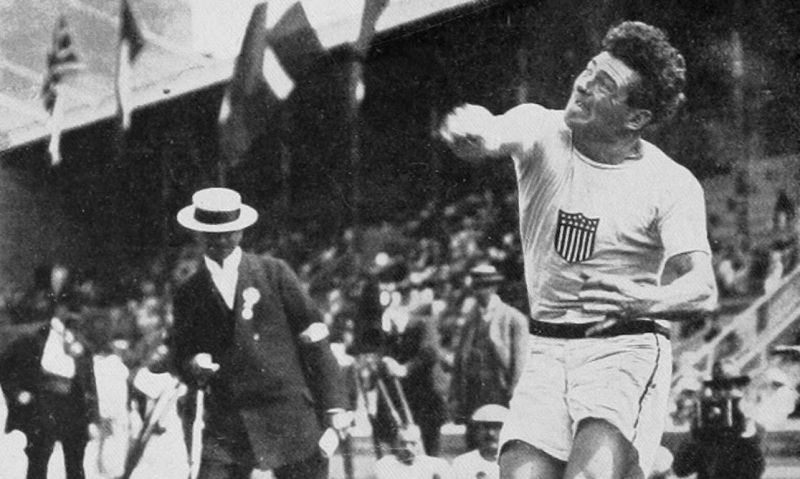
As Olympics kick off in Paris, Post 1 officer tells the history of post founder who medaled in 1912.
We who served are no strangers to medals. Whether we have a few or many, we know the stories they tell. But some Legionnaires, feeling the rush of accomplishment, were awarded medals prior to their service.
Every few years, nations from around the globe compete in the Olympics. Starting July 26, they will be in Paris where Post 1 – the “Mother Post” – will be on the front line.
As post historian and membership chairman, I engaged in a unique project to discover the founders of our post. In researching over a thousand former members, I discovered many unique individuals, James “Jim” Henry Duncan among them. Not only was he an Olympic medalist, but he had a long and distinguished athletic career.
This discovery led to many questions that are pertinent to maintaining our relevance and sustainability as an organization. If we do not know our history and continue to commemorate our former members, we will have a hard time articulating our reason for existing with new members.
The stewards of our overseas war memorials and cemeteries employed by the American Battle Monuments Commission (ABMC) have been a subject of great interest of mine for over a decade. One characteristic about some of them has always struck a chord: How can someone serve in a time like World War I or World War II, then spend day after day maintaining the stones that bear the names of people they served with? I have researched thousands of graves overseas, and I feel like I have gotten to know a lot about them, but I don’t know if I have what it takes to look over a single grave of a fallen comrade. This is also a part of Jim Duncan’s story, as he was the first superintendent of Suresnes American Cemetery outside Paris, and continued in the position for its first 12 years.
Duncan had the literal weight of the world holding him back. Born in New York, he was placed in an orphanage at 4 and spent the next decade being formed by this experience. Such was his will that he persevered against his circumstances. This struggle shaped his competitive spirit – he became a survivor and a hero as he overcame the obstacles of his life and found a path to being a career athlete.
Eventually, Duncan became the inaugural world-record holder in discus, leading up to the Stockholm Games of 1912. Favored to take the gold, he instead earned the bronze behind a Swedish competitor and his teammate. He maintained his world record of 47.59 m – set on 27 May 1912 in Celtic Park in Queens – well into the 1920s. His records for individual right and left-hand throws held into the 1930s.
The Stockholm Games are well-known for many reasons. This was the competition in which Gen. George Patton also participated; the last competition where the gold was solid and not plated; and is also famous for the controversy that jeopardized Jim Thorpe’s qualification to compete – his medals were stripped and his marks stricken from the official record after the International Olympic Committee learned he had previously played minor-league baseball, counter to their rules on amateurism. It is difficult to verify how many, but it is believed that a large number of track-and-field competitors threw their medals away in protest of Thorpe’s treatment by the committee. The Duncan family believes his bronze was a victim of this protest, and their quest to have it replicated has begun. The quest continues, with Paris Post 1 (through me) as a partner in the effort.
Duncan’s legacy continued with a celebrity status in the world of athletics, but America’s commitment to the Allies in World War I changed his path, and he was sent to the front. His service started as an enlisted man, but by war's end he was a second lieutenant in the 11th Engineers. Much of his service record is unknown, but there is one report stating, “Sgt. Duncan was among the American engineers who, during the battle of Cambrai, dropped all work, grabbed up rifles and went to the aid of the British soldiers in the front lines.”
After the war but still in uniform, Duncan competed in the Inter-Allied Games in France. He was honorably discharged (I believe in France) in August 1919. Evidence suggests he spent some time with the French National Olympic Team in 1920 as a trainer, but as of yet I have not obtained the details from a French authority. As his time passed with the ABMC, he married and became an avid participant in Post 1’s baseball team as the American Expeditionary Forces withdraw from the continent along with their teams, new competition emerged in the form of the London post, their chief rivals for baseball dominance in Europe.
Jim Duncan was a founder of Paris Post 1, the modern Olympic Games and the ABMC. He was an emissary of international competition through sport and a pioneer in the modern concept of global citizenship. Born Sept. 25, 1887, he died on Jan. 21, 1955, and now rests in Section 6 at Grave 9447-B in Arlington National Cemetery. His legacy is being further captured in an autobiography written by his grandson James Duncan, title to be determined.
Discovering these details about the members of Paris Post 1 has allowed me a unique opportunity to invite their modern families back, as I have done with so many others. I suspect I will have another Olympic story to tell as our post continues to grow and serve on the front lines of remembrance. If you’re in Paris, reach out! We have so many stories involving our founders and their role at the “Second Embassy” of Pershing Hall.
- FODPAL

